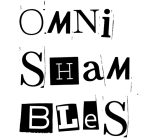Each year at the beginning of January, the American Dialect Society announces its Word of the Year (WOTY), based on thousands of submissions from anyone who cares to send them an e-mail. Word junkies look forward to this and often pitch in with their own suggestions. I thought Gangnam style might well have been in with a chance but I’ve never yet predicted the winner and2012 was no exception. The winner was the hashtag – very familiar to those of us who use Twitter – with Gangnam style at least being in the final six.
Over the pond, the good people of the Oxford English Dictionary announced their WOTY for 2012 as omnishambles. This is a noun defined as “a situation that has been comprehensively mismanaged, and is characterized by a string of blunders and miscalculations.” To my knowledge, it hasn’t gained any currency in the US – but should! It’s a great little word that was actually modified during the November US elections into “RomneyShambles” by European political pundits who were less than supportive of Mitt.
Clearly it’s a marriage of the Latin prefix omni– meaning “all” and shambles, meaning a great disorder. Omni is also the name of the first writer in the Book of Omni, one of the books that make up the Book of Mormon. Sadly for Omni, his personal contribution to the book that bears his name is three paragraphs, which contains the sum of what we know about him. Basically, he claims to be a bad man, prone to breaking commandments, and fought a lot with the Lamanites, who were descendants of an Israeli family who moved to the US around 600 BC. We also hear in these paragraphs that Omni was the son of Jarom and the father of Amaron, and that he was the keeper of the golden plates that were found by the founder of Mormonism, Joseph Smith Jr., and then translated into the Book of Mormon.
The word shambles is from the Old English sceamel, which was used back in the 9th century to mean a footstool. It’s a wonderful example of how a word can change its meaning over time, piece by piece. By the 10th century it was being used to describe a table used to sell goods of any kind, but this evolved into the 14th century word schamell meaning specifically “a table from which meat was sold.”
By the 15th century, it was used to refer to any place where meat was sold – essentially a meat market. Then by the 16th century it was used figuratively to describe a place of carnage, such as a battlefield or any place of mass slaughter. And by now, the word had settled down as shambles. It then took on its modern meaning of “a scene of chaos and disorder” in the 20th century, with its original sense of a footstool having long been lost.
Tourists to the city of York in England typically visit a street called The Shambles, which is very narrow and contains some buildings that date back to the 14th century. It was originally called The Flesh Shambles because is was full of butchers’ shops. Other places in the UK have streets called The Shambles but the one in York is perhaps the most well known.
So try slipping omnishambles into your next conversation. As I write, here in the US we’re facing the prospect of swingeing government cuts in the near future and the failure of our elected representatives to sort this one out really will be an omnishambles!

